外研版(2019)必修 第一册Unit 2 Exploring English Understanding ideas 语言点课件(共21张PPT)
文档属性
| 名称 | 外研版(2019)必修 第一册Unit 2 Exploring English Understanding ideas 语言点课件(共21张PPT) | 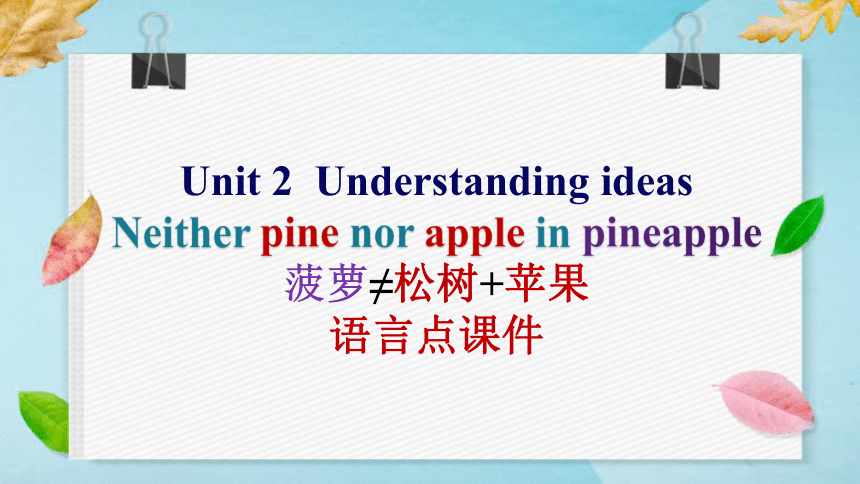 | |
| 格式 | pptx | ||
| 文件大小 | 666.4KB | ||
| 资源类型 | 教案 | ||
| 版本资源 | 外研版(2019) | ||
| 科目 | 英语 | ||
| 更新时间 | 2024-10-10 16:43:32 | ||
图片预览

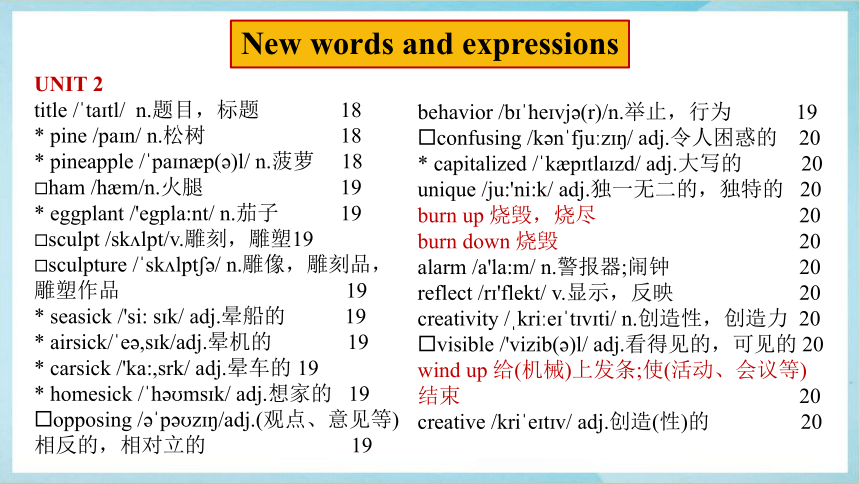
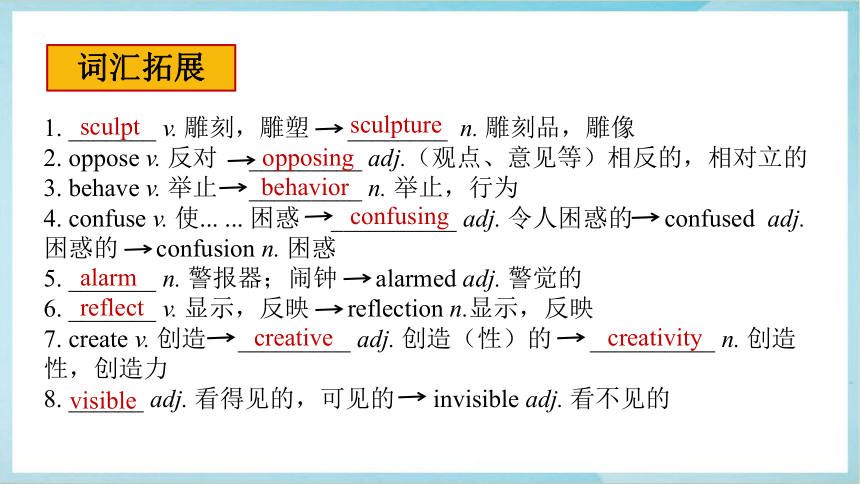

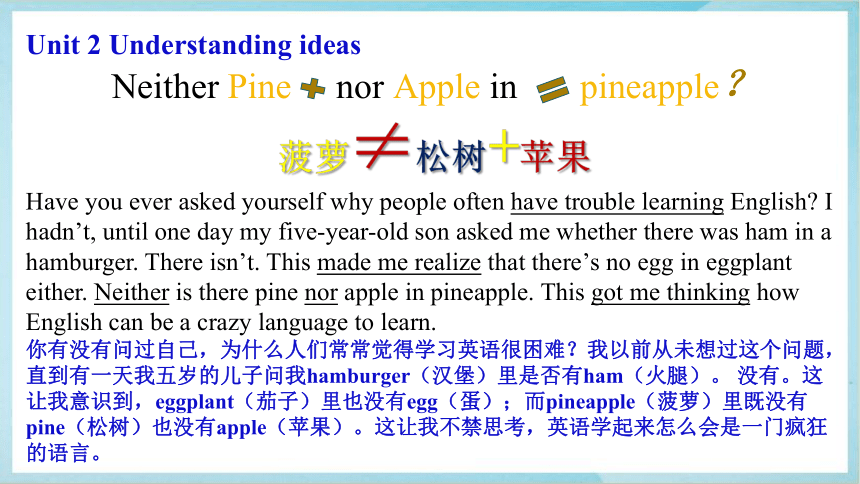
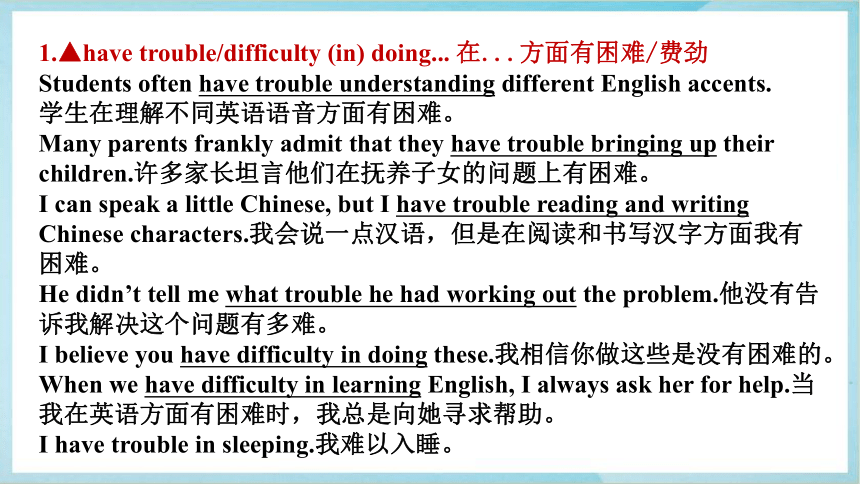
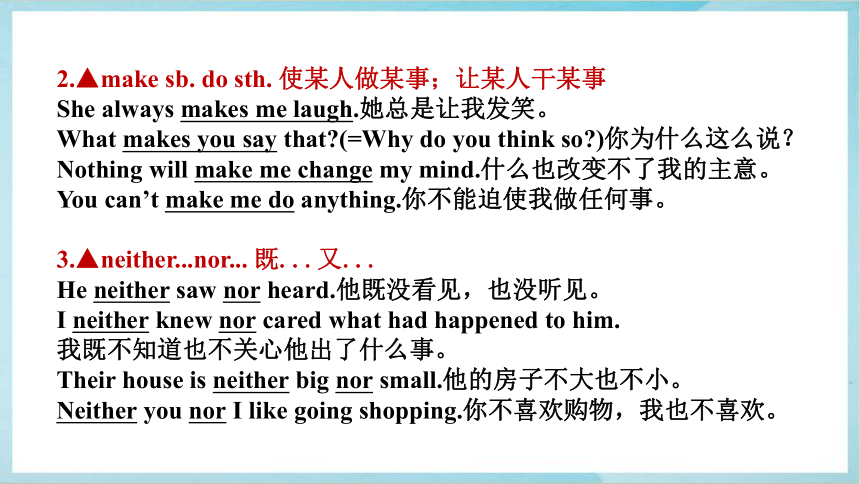
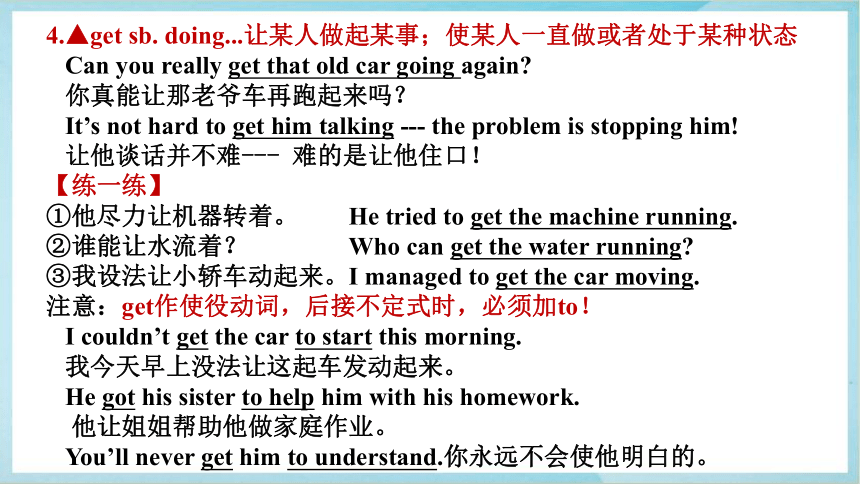
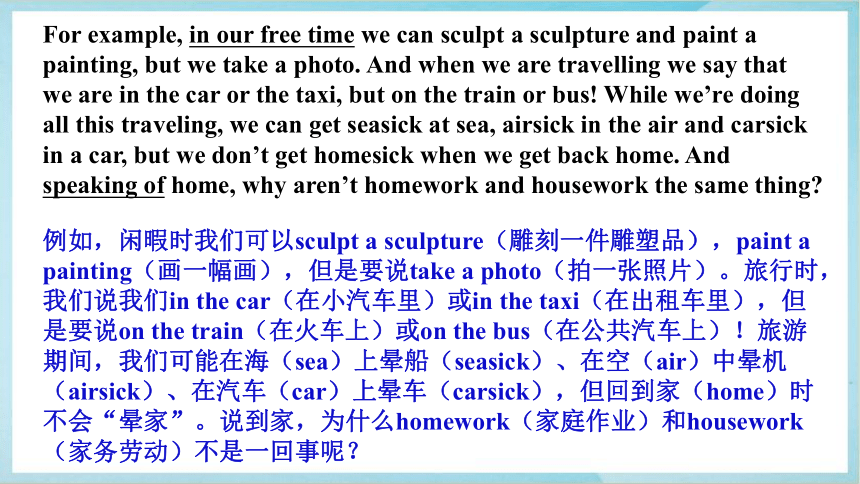
文档简介
(共21张PPT)
Unit 2 Understanding ideas
Neither pine nor apple in pineapple
菠萝≠松树+苹果
语言点课件
New words and expressions
UNIT 2
title / ta tl/ n.题目,标题 18
* pine /pa n/ n.松树 18
* pineapple / pa n p( )l/ n.菠萝 18
ham /h m/n.火腿 19
* eggplant /'egpla:nt/ n.茄子 19
sculpt /sk lpt/v.雕刻,雕塑 19
sculpture / sk lpt / n.雕像,雕刻品,雕塑作品 19
* seasick /'si: s k/ adj.晕船的 19
* airsick/ e ,s k/adj.晕机的 19
* carsick /'ka:,srk/ adj.晕车的 19
* homesick / h ms k/ adj.想家的 19
opposing / p z /adj.(观点、意见等)相反的,相对立的 19
behavior /b he vj (r)/n.举止,行为 19
confusing /k n fju z / adj.令人困惑的 20
* capitalized / k p tla zd/ adj.大写的 20
unique /ju:'ni:k/ adj.独一无二的,独特的 20
burn up 烧毁,烧尽 20
burn down 烧毁 20
alarm /a'la:m/ n.警报器;闹钟 20
reflect /r 'flekt/ v.显示,反映 20
creativity / kri e t v ti/ n.创造性,创造力 20
visible /'vizib( )l/ adj.看得见的,可见的 20
wind up 给(机械)上发条;使(活动、会议等)
结束 20
creative /kri e t v/ adj.创造(性)的 20
1. _______ v. 雕刻,雕塑 ________ n. 雕刻品,雕像
2. oppose v. 反对 _________ adj.(观点、意见等)相反的,相对立的
3. behave v. 举止 _________ n. 举止,行为
4. confuse v. 使... ... 困惑 __________ adj. 令人困惑的 confused adj. 困惑的 confusion n. 困惑
5. _______ n. 警报器;闹钟 alarmed adj. 警觉的
6. _______ v. 显示,反映 reflection n.显示,反映
7. create v. 创造 _________ adj. 创造(性)的 __________ n. 创造性,创造力
8. ______ adj. 看得见的,可见的 invisible adj. 看不见的
sculpt
sculpture
opposing
behavior
confusing
词汇拓展
alarm
reflect
creative
creativity
visible
4
本课文重点掌握短语
have trouble (in)doing
get...doing
in one’s free time
speaking of
wonder at
burn up/down
fill in/out a form
human race
wind up
5
Unit 2 Understanding ideas
Neither Pine nor Apple in pineapple?
菠萝≠松树+苹果
Have you ever asked yourself why people often have trouble learning English I hadn’t, until one day my five-year-old son asked me whether there was ham in a hamburger. There isn’t. This made me realize that there’s no egg in eggplant either. Neither is there pine nor apple in pineapple. This got me thinking how English can be a crazy language to learn.
你有没有问过自己,为什么人们常常觉得学习英语很困难?我以前从未想过这个问题,直到有一天我五岁的儿子问我hamburger(汉堡)里是否有ham(火腿)。 没有。这让我意识到,eggplant(茄子)里也没有egg(蛋);而pineapple(菠萝)里既没有pine(松树)也没有apple(苹果)。这让我不禁思考,英语学起来怎么会是一门疯狂的语言。
1.▲have trouble/difficulty (in) doing... 在...方面有困难/费劲
Students often have trouble understanding different English accents.
学生在理解不同英语语音方面有困难。
Many parents frankly admit that they have trouble bringing up their children.许多家长坦言他们在抚养子女的问题上有困难。
I can speak a little Chinese, but I have trouble reading and writing Chinese characters.我会说一点汉语,但是在阅读和书写汉字方面我有困难。
He didn’t tell me what trouble he had working out the problem.他没有告诉我解决这个问题有多难。
I believe you have difficulty in doing these.我相信你做这些是没有困难的。
When we have difficulty in learning English, I always ask her for help.当我在英语方面有困难时,我总是向她寻求帮助。
I have trouble in sleeping.我难以入睡。
7
2.▲make sb. do sth. 使某人做某事;让某人干某事
She always makes me laugh.她总是让我发笑。
What makes you say that (=Why do you think so )你为什么这么说?
Nothing will make me change my mind.什么也改变不了我的主意。
You can’t make me do anything.你不能迫使我做任何事。
3.▲neither...nor... 既...又...
He neither saw nor heard.他既没看见,也没听见。
I neither knew nor cared what had happened to him.
我既不知道也不关心他出了什么事。
Their house is neither big nor small.他的房子不大也不小。
Neither you nor I like going shopping.你不喜欢购物,我也不喜欢。
4.▲get sb. doing...让某人做起某事;使某人一直做或者处于某种状态
Can you really get that old car going again
你真能让那老爷车再跑起来吗?
It’s not hard to get him talking --- the problem is stopping him!
让他谈话并不难--- 难的是让他住口!
【练一练】
①他尽力让机器转着。 He tried to get the machine running.
②谁能让水流着? Who can get the water running
③我设法让小轿车动起来。I managed to get the car moving.
注意:get作使役动词,后接不定式时,必须加to!
I couldn’t get the car to start this morning.
我今天早上没法让这起车发动起来。
He got his sister to help him with his homework.
他让姐姐帮助他做家庭作业。
You’ll never get him to understand.你永远不会使他明白的。
For example, in our free time we can sculpt a sculpture and paint a painting, but we take a photo. And when we are travelling we say that we are in the car or the taxi, but on the train or bus! While we’re doing all this traveling, we can get seasick at sea, airsick in the air and carsick in a car, but we don’t get homesick when we get back home. And speaking of home, why aren’t homework and housework the same thing
例如,闲暇时我们可以sculpt a sculpture(雕刻一件雕塑品),paint a painting(画一幅画),但是要说take a photo(拍一张照片)。旅行时,我们说我们in the car(在小汽车里)或in the taxi(在出租车里),但是要说on the train(在火车上)或on the bus(在公共汽车上)!旅游期间,我们可能在海(sea)上晕船(seasick)、在空(air)中晕机(airsick)、在汽车(car)上晕车(carsick),但回到家(home)时不会“晕家”。说到家,为什么homework(家庭作业)和housework(家务劳动)不是一回事呢?
5.▲in one’s free time在某人的空暇时间;在业余时间
In his free time he taught himself French.业余时间他自学法语。
He took an active part in the volunteer work in his free time.
空余时间他积极参加志愿者工作。
In their free time they finished the task of organizing the after-school activities.利用空余时间他们组织了课外活动。
6.▲speaking of说到;谈到;谈及
Speaking of the US dollar, I think this is what we should worry about.
说到美元这个问题,我认为这才是我们应当担心的问题。
Speaking of teachers, I can’t forget my parents, who taught me the importance of work and how to tell right from wrong.
说到老师,我不能忘记我的父母,他们教会我工作重要性,如何区分对错。
If “hard” is the opposite of “soft”, why are “hardly” and “softly” not an opposing pair If harmless actions are the opposite of harmful actions, why are shameless and shameful behaviors the same
如果“hard”(坚硬的)是“soft”(柔软的)的反义词,为什么“hardly”(几乎不)和“softly”(柔软地)却不是一对反义词呢?如果harmless actions(无害的行为)是harmful actions(有害的行为)的反义词,为什么shameless behaviors(无耻的行为)和shameful behaviors(可耻的行为)是同义词呢?
7.▲hardly简直不,几乎不
Sometimes I hardly dare open my mouth.有时我几乎不敢开口说话。
I hardly know you1.我几乎不了解你。
I hardly dared to hope she’d remember me.我几乎不敢指望他会记得我。
I hardly slept at all and felt pretty awful.我几乎没睡,感觉挺难受。
Hardly anyone has bothered to reply.几乎每人动嘴回答。(hardly放在句首构成倒装。)
When we look out of the window and see rain or snow, we can say “It’s raining” or “it’s snowing”. But when we see sunshine, we can’t say “it’s sunshining”.
当我们向窗外看去,看到rain(雨)或snow(雪)时,我们可以说“it’s raining”(下雨了)或“it’s snowing”(下雪了),但我们不能说“it’s sunshining”(下阳光了)。
Even the smallest words can be confusing. When you see the capitalized “WHO” in a medical report, do you read it as the “who” in “Who’s that ” “What about “IT” and “US”
即使最简单的词也可能让人感到困惑。在医学报告中看到大写的“WHO”时,你会将会它理解为“Who’s that?”(那是谁)中的“who”(谁)吗?那么“IT”和“US”呢?你也一定对一门语言独特的疯狂感到诧异。在这门语言中,当一座房子“被烧毁”(burns down)时它就“烧毁”(burn up)了;你通过“填写它”(filling it out)的方式“填写表格”(fill in a form);闹钟只有在它响起(goes off)时才被听到!
13
8.▲WHO=World Health Organization世界卫生组织,世卫组织
IT=Information Technology信息技术
US=the United States美国
About half of all smokers are killed by their addiction, WHO reported.
世界卫生组织报告说,约一半的吸烟者死于他们的癖好。
You also have to wonder at the unique madness of a language in which a house can burn up as it burns down, in which you fill in a form by filling it out, and in which an alarm is only heard once it goes off!
你也一定对一门语言独特的疯狂感到诧异。在这门语言中,当一座房子“被烧毁”(burns down)时它就“烧毁”(burn up)了;你通过“填写它”(filling it out)的方式“填写表格”(fill in a form);闹钟只有在它响起(goes off)时才被听到!
14
9.▲wonder at对...感到吃惊
I could only wonder at how far this woman had come.
我只能对这名妇女远道而来感到惊讶。
They wonder at the boy’s wit.他们对男孩的机智感到惊讶。
I wonder at your allowing her to buy the expensive clothes.
我对你答应她买这么贵的衣服感到吃惊。
You should wonder at the things nobody else is wondering about.
你应该思考别人不思考的问题。
10.▲burn up烧毁;烧尽
Most of the woodland has now been burnt up.现在大多数林地被烧光了。
Let’s burn up all this waste paper.咱们把这些废纸烧掉吧!
Even if you only have one meeting a day with investors, somehow that one meeting will burn up your whole day.即使你一天只和投资者会谈一次,就是这样一次的会面也会莫名其妙的花掉你整天的时间。
15
11.▲burn down烧毁,火力减弱;烧光
They threatened to burn down our house.他们威胁要烧毁我们的房子。
If you forgot to turn it off when you went away, you might burn down the house.如果你走的时候忘记关掉它,可能会把房子给烧了。
Your house can burn down and your family can leave you. What you have learned is the one thing that can never be taken away.
你的房子可能会被烧毁,你的家人可能会离你而去,而你所学到的才是唯一无法夺走的东西。
12.▲fill in (a form)填写(表格等);填充;替代
Fill in the information there.请在那里填充你的信息。
Fill in your name and address on the list.把你的名字和地址填在这张表上。
Teachers will be asked to fill in a questionnaire.
教师们将被要求填写一份调查问卷。
Fill in your address at the bottom of the application.
在申请表的最下面写下你的地址。
Some people find it difficult to fill in a form.有些人觉得表格不好填写。
16
13.▲fill out填写;变丰满,变大;填表
All aliens have to fill out this form.
所有的外侨都必须填写这个表格。
How do I fill out this form
请问如何填写这份表格?
Could you fill out this form with your name and forwarding address
请你在这份表格上填写您的姓名和寄送地址好吗?
You must fill out this order form.
这个订货单你要填一下。
Please fill out this form.
请填写这份表格。
English was invented by people, not computers, and it reflects the creativity of the human race. That is why when the stars are out, they are visible, but when the lights are out, they are invisible. And that is why when I wind up my watch, it starts, but when I wind up this passage, it ends.
英语是由人而不是电脑发明的,它反映了人类的创造力。那就是为什么星星出来(out)时,它们可以被看到(visible),但是当灯熄灭(out)后,它们不能被看到(invisible)。那也是为什么但我给手表wind up(上紧)发条时,他开始走,但是当我wind up(结束)这篇文章时,它就到结尾了。
14.▲human race人类;全人类
It’s neither aliens nor a rare disease that will threaten the human race in the future, but climate change.未来威胁人类的不是外星人,也不是罕见的疾病,而是气候的变化。
For many landing on the moon is one of the human race’s greatest achievements.对于大多数来说,登月是人类进程史上最伟大的成就。
15.▲wind up上紧(钟、表等的)发条;结束;使紧张,兴奋
▼wind v. (wound,wound) 蜿蜒;曲折而行;迂回(to have many bends and twists)
The path wound down to the beach. 这条小路弯弯曲曲通向海滩。
The river winds its way between two meadows.
这条河蜿蜒流经两个牧场之间。
I always said he would wind up in prison.我以前一直说他终归要进班房。
We eventually wound up staying in a little hotel a few miles from town.
我们最后在离城几英里的一家小旅馆里落脚。
If you take risks like that you’ll wind up dead.你要是冒那种险就会把命赔上。
The speaker was just winding up when the door was open.
演讲者刚要结束讲话时门突然就开了。
If we all agree, let’s wind up the discussion.
如果我们大家都同意,咱们就结束讨论吧。
The president is about to wind up his visit to Somalia.总统即将结束对索马里的访问。
He had forgotten to wind up his watch.他忘了给表上发条了。
1. have trouble/difficulty
(in) doing... 在...方面有困难/费劲
2. make sb. do sth.
3.neither...nor...
4. get sb. doing...
5. in one’s free time
6. speaking of
7. wonder at
8.burn up
8. burn down
9. fill in a form
10.fill out
11. human race
13. wind up
在……方面有困难/费劲
既……又……
让某人做起某事
在某人的空暇时间;在业余时间
说到;谈到;谈及
对……感到吃惊
烧毁;烧尽
烧毁,火力减弱;烧光
填写;填充;替代
填写;变丰满,变大;填表
人类;全人类
使某人做某事;让某人干某事
复习回顾
上(钟、表等)发条;结束;使紧张,兴奋
菠萝≠松树+苹果
你有没有问过自己,为什么人们常常觉得学习英语很困难?我以前从未想过这个问题,直到有一天我五岁的儿子问我hamburger(汉堡)里是否有ham(火腿)。 没有。这让我意识到,eggplant(茄子)里也没有egg(蛋);而pineapple(菠萝)里既没有pine(松树)也没有apple(苹果)。这让我不禁思考,英语学起来怎么会是一门疯狂的语言。
例如,闲暇时我们可以sculpt a sculpture(雕刻一件雕塑品),paint a painting(画一幅画),但是要说take a photo(拍一张照片)。旅行时,我们说我们in the car(在小汽车里)或in the taxi(在出租车里),但是要说on the train(在火车上)或on the bus(在公共汽车上)!旅游期间,我们可能在海(sea)上晕船(seasick)、在空(air)中晕机(airsick)、在汽车(car)上晕车(carsick),但回到家(home)时不会“晕家”。说到家,为什么homework(家庭作业)和housework(家务劳动)不是一回事呢?
如果“hard”(坚硬的)是“soft”(柔软的)的反义词,为什么“hardly”(几乎不)和“softly”(柔软地)却不是一对反义词呢?如果harmless actions(无害的行为)是harmful actions(有害的行为)的反义词,为什么shameless behaviors(无耻的行为)和shameful behaviors(可耻的行为)是同义词呢?
即使最简单的词也可能让人感到困惑。在医学报告中看到大写的“WHO”时,你会将会它理解为“Who’s that?”(那是谁)中的“who”(谁)吗?那么“IT”和“US”呢?
你也一定对一门语言独特的疯狂感到诧异。在这门语言中,当一座房子“被烧毁”(burns down)时它就“烧毁”(burn up)了;你通过“填写它”(filling it out)的方式“填写表格”(fill in a form);闹钟只有在它响起(goes off)时才被听到!
英语是由人而不是电脑发明的,它反映了人类的创造力。那就是为什么星星出来(out)时,它们可以被看到(visible),但是当灯熄灭(out)后,它们不能被看到(invisible)。那也是为什么但我给手表wind up(上紧)发条时,他开始走,但是当我wind up(结束)这篇文章时,它就到结尾了。
Unit 2 Understanding ideas
Neither pine nor apple in pineapple
菠萝≠松树+苹果
语言点课件
New words and expressions
UNIT 2
title / ta tl/ n.题目,标题 18
* pine /pa n/ n.松树 18
* pineapple / pa n p( )l/ n.菠萝 18
ham /h m/n.火腿 19
* eggplant /'egpla:nt/ n.茄子 19
sculpt /sk lpt/v.雕刻,雕塑 19
sculpture / sk lpt / n.雕像,雕刻品,雕塑作品 19
* seasick /'si: s k/ adj.晕船的 19
* airsick/ e ,s k/adj.晕机的 19
* carsick /'ka:,srk/ adj.晕车的 19
* homesick / h ms k/ adj.想家的 19
opposing / p z /adj.(观点、意见等)相反的,相对立的 19
behavior /b he vj (r)/n.举止,行为 19
confusing /k n fju z / adj.令人困惑的 20
* capitalized / k p tla zd/ adj.大写的 20
unique /ju:'ni:k/ adj.独一无二的,独特的 20
burn up 烧毁,烧尽 20
burn down 烧毁 20
alarm /a'la:m/ n.警报器;闹钟 20
reflect /r 'flekt/ v.显示,反映 20
creativity / kri e t v ti/ n.创造性,创造力 20
visible /'vizib( )l/ adj.看得见的,可见的 20
wind up 给(机械)上发条;使(活动、会议等)
结束 20
creative /kri e t v/ adj.创造(性)的 20
1. _______ v. 雕刻,雕塑 ________ n. 雕刻品,雕像
2. oppose v. 反对 _________ adj.(观点、意见等)相反的,相对立的
3. behave v. 举止 _________ n. 举止,行为
4. confuse v. 使... ... 困惑 __________ adj. 令人困惑的 confused adj. 困惑的 confusion n. 困惑
5. _______ n. 警报器;闹钟 alarmed adj. 警觉的
6. _______ v. 显示,反映 reflection n.显示,反映
7. create v. 创造 _________ adj. 创造(性)的 __________ n. 创造性,创造力
8. ______ adj. 看得见的,可见的 invisible adj. 看不见的
sculpt
sculpture
opposing
behavior
confusing
词汇拓展
alarm
reflect
creative
creativity
visible
4
本课文重点掌握短语
have trouble (in)doing
get...doing
in one’s free time
speaking of
wonder at
burn up/down
fill in/out a form
human race
wind up
5
Unit 2 Understanding ideas
Neither Pine nor Apple in pineapple?
菠萝≠松树+苹果
Have you ever asked yourself why people often have trouble learning English I hadn’t, until one day my five-year-old son asked me whether there was ham in a hamburger. There isn’t. This made me realize that there’s no egg in eggplant either. Neither is there pine nor apple in pineapple. This got me thinking how English can be a crazy language to learn.
你有没有问过自己,为什么人们常常觉得学习英语很困难?我以前从未想过这个问题,直到有一天我五岁的儿子问我hamburger(汉堡)里是否有ham(火腿)。 没有。这让我意识到,eggplant(茄子)里也没有egg(蛋);而pineapple(菠萝)里既没有pine(松树)也没有apple(苹果)。这让我不禁思考,英语学起来怎么会是一门疯狂的语言。
1.▲have trouble/difficulty (in) doing... 在...方面有困难/费劲
Students often have trouble understanding different English accents.
学生在理解不同英语语音方面有困难。
Many parents frankly admit that they have trouble bringing up their children.许多家长坦言他们在抚养子女的问题上有困难。
I can speak a little Chinese, but I have trouble reading and writing Chinese characters.我会说一点汉语,但是在阅读和书写汉字方面我有困难。
He didn’t tell me what trouble he had working out the problem.他没有告诉我解决这个问题有多难。
I believe you have difficulty in doing these.我相信你做这些是没有困难的。
When we have difficulty in learning English, I always ask her for help.当我在英语方面有困难时,我总是向她寻求帮助。
I have trouble in sleeping.我难以入睡。
7
2.▲make sb. do sth. 使某人做某事;让某人干某事
She always makes me laugh.她总是让我发笑。
What makes you say that (=Why do you think so )你为什么这么说?
Nothing will make me change my mind.什么也改变不了我的主意。
You can’t make me do anything.你不能迫使我做任何事。
3.▲neither...nor... 既...又...
He neither saw nor heard.他既没看见,也没听见。
I neither knew nor cared what had happened to him.
我既不知道也不关心他出了什么事。
Their house is neither big nor small.他的房子不大也不小。
Neither you nor I like going shopping.你不喜欢购物,我也不喜欢。
4.▲get sb. doing...让某人做起某事;使某人一直做或者处于某种状态
Can you really get that old car going again
你真能让那老爷车再跑起来吗?
It’s not hard to get him talking --- the problem is stopping him!
让他谈话并不难--- 难的是让他住口!
【练一练】
①他尽力让机器转着。 He tried to get the machine running.
②谁能让水流着? Who can get the water running
③我设法让小轿车动起来。I managed to get the car moving.
注意:get作使役动词,后接不定式时,必须加to!
I couldn’t get the car to start this morning.
我今天早上没法让这起车发动起来。
He got his sister to help him with his homework.
他让姐姐帮助他做家庭作业。
You’ll never get him to understand.你永远不会使他明白的。
For example, in our free time we can sculpt a sculpture and paint a painting, but we take a photo. And when we are travelling we say that we are in the car or the taxi, but on the train or bus! While we’re doing all this traveling, we can get seasick at sea, airsick in the air and carsick in a car, but we don’t get homesick when we get back home. And speaking of home, why aren’t homework and housework the same thing
例如,闲暇时我们可以sculpt a sculpture(雕刻一件雕塑品),paint a painting(画一幅画),但是要说take a photo(拍一张照片)。旅行时,我们说我们in the car(在小汽车里)或in the taxi(在出租车里),但是要说on the train(在火车上)或on the bus(在公共汽车上)!旅游期间,我们可能在海(sea)上晕船(seasick)、在空(air)中晕机(airsick)、在汽车(car)上晕车(carsick),但回到家(home)时不会“晕家”。说到家,为什么homework(家庭作业)和housework(家务劳动)不是一回事呢?
5.▲in one’s free time在某人的空暇时间;在业余时间
In his free time he taught himself French.业余时间他自学法语。
He took an active part in the volunteer work in his free time.
空余时间他积极参加志愿者工作。
In their free time they finished the task of organizing the after-school activities.利用空余时间他们组织了课外活动。
6.▲speaking of说到;谈到;谈及
Speaking of the US dollar, I think this is what we should worry about.
说到美元这个问题,我认为这才是我们应当担心的问题。
Speaking of teachers, I can’t forget my parents, who taught me the importance of work and how to tell right from wrong.
说到老师,我不能忘记我的父母,他们教会我工作重要性,如何区分对错。
If “hard” is the opposite of “soft”, why are “hardly” and “softly” not an opposing pair If harmless actions are the opposite of harmful actions, why are shameless and shameful behaviors the same
如果“hard”(坚硬的)是“soft”(柔软的)的反义词,为什么“hardly”(几乎不)和“softly”(柔软地)却不是一对反义词呢?如果harmless actions(无害的行为)是harmful actions(有害的行为)的反义词,为什么shameless behaviors(无耻的行为)和shameful behaviors(可耻的行为)是同义词呢?
7.▲hardly简直不,几乎不
Sometimes I hardly dare open my mouth.有时我几乎不敢开口说话。
I hardly know you1.我几乎不了解你。
I hardly dared to hope she’d remember me.我几乎不敢指望他会记得我。
I hardly slept at all and felt pretty awful.我几乎没睡,感觉挺难受。
Hardly anyone has bothered to reply.几乎每人动嘴回答。(hardly放在句首构成倒装。)
When we look out of the window and see rain or snow, we can say “It’s raining” or “it’s snowing”. But when we see sunshine, we can’t say “it’s sunshining”.
当我们向窗外看去,看到rain(雨)或snow(雪)时,我们可以说“it’s raining”(下雨了)或“it’s snowing”(下雪了),但我们不能说“it’s sunshining”(下阳光了)。
Even the smallest words can be confusing. When you see the capitalized “WHO” in a medical report, do you read it as the “who” in “Who’s that ” “What about “IT” and “US”
即使最简单的词也可能让人感到困惑。在医学报告中看到大写的“WHO”时,你会将会它理解为“Who’s that?”(那是谁)中的“who”(谁)吗?那么“IT”和“US”呢?你也一定对一门语言独特的疯狂感到诧异。在这门语言中,当一座房子“被烧毁”(burns down)时它就“烧毁”(burn up)了;你通过“填写它”(filling it out)的方式“填写表格”(fill in a form);闹钟只有在它响起(goes off)时才被听到!
13
8.▲WHO=World Health Organization世界卫生组织,世卫组织
IT=Information Technology信息技术
US=the United States美国
About half of all smokers are killed by their addiction, WHO reported.
世界卫生组织报告说,约一半的吸烟者死于他们的癖好。
You also have to wonder at the unique madness of a language in which a house can burn up as it burns down, in which you fill in a form by filling it out, and in which an alarm is only heard once it goes off!
你也一定对一门语言独特的疯狂感到诧异。在这门语言中,当一座房子“被烧毁”(burns down)时它就“烧毁”(burn up)了;你通过“填写它”(filling it out)的方式“填写表格”(fill in a form);闹钟只有在它响起(goes off)时才被听到!
14
9.▲wonder at对...感到吃惊
I could only wonder at how far this woman had come.
我只能对这名妇女远道而来感到惊讶。
They wonder at the boy’s wit.他们对男孩的机智感到惊讶。
I wonder at your allowing her to buy the expensive clothes.
我对你答应她买这么贵的衣服感到吃惊。
You should wonder at the things nobody else is wondering about.
你应该思考别人不思考的问题。
10.▲burn up烧毁;烧尽
Most of the woodland has now been burnt up.现在大多数林地被烧光了。
Let’s burn up all this waste paper.咱们把这些废纸烧掉吧!
Even if you only have one meeting a day with investors, somehow that one meeting will burn up your whole day.即使你一天只和投资者会谈一次,就是这样一次的会面也会莫名其妙的花掉你整天的时间。
15
11.▲burn down烧毁,火力减弱;烧光
They threatened to burn down our house.他们威胁要烧毁我们的房子。
If you forgot to turn it off when you went away, you might burn down the house.如果你走的时候忘记关掉它,可能会把房子给烧了。
Your house can burn down and your family can leave you. What you have learned is the one thing that can never be taken away.
你的房子可能会被烧毁,你的家人可能会离你而去,而你所学到的才是唯一无法夺走的东西。
12.▲fill in (a form)填写(表格等);填充;替代
Fill in the information there.请在那里填充你的信息。
Fill in your name and address on the list.把你的名字和地址填在这张表上。
Teachers will be asked to fill in a questionnaire.
教师们将被要求填写一份调查问卷。
Fill in your address at the bottom of the application.
在申请表的最下面写下你的地址。
Some people find it difficult to fill in a form.有些人觉得表格不好填写。
16
13.▲fill out填写;变丰满,变大;填表
All aliens have to fill out this form.
所有的外侨都必须填写这个表格。
How do I fill out this form
请问如何填写这份表格?
Could you fill out this form with your name and forwarding address
请你在这份表格上填写您的姓名和寄送地址好吗?
You must fill out this order form.
这个订货单你要填一下。
Please fill out this form.
请填写这份表格。
English was invented by people, not computers, and it reflects the creativity of the human race. That is why when the stars are out, they are visible, but when the lights are out, they are invisible. And that is why when I wind up my watch, it starts, but when I wind up this passage, it ends.
英语是由人而不是电脑发明的,它反映了人类的创造力。那就是为什么星星出来(out)时,它们可以被看到(visible),但是当灯熄灭(out)后,它们不能被看到(invisible)。那也是为什么但我给手表wind up(上紧)发条时,他开始走,但是当我wind up(结束)这篇文章时,它就到结尾了。
14.▲human race人类;全人类
It’s neither aliens nor a rare disease that will threaten the human race in the future, but climate change.未来威胁人类的不是外星人,也不是罕见的疾病,而是气候的变化。
For many landing on the moon is one of the human race’s greatest achievements.对于大多数来说,登月是人类进程史上最伟大的成就。
15.▲wind up上紧(钟、表等的)发条;结束;使紧张,兴奋
▼wind v. (wound,wound) 蜿蜒;曲折而行;迂回(to have many bends and twists)
The path wound down to the beach. 这条小路弯弯曲曲通向海滩。
The river winds its way between two meadows.
这条河蜿蜒流经两个牧场之间。
I always said he would wind up in prison.我以前一直说他终归要进班房。
We eventually wound up staying in a little hotel a few miles from town.
我们最后在离城几英里的一家小旅馆里落脚。
If you take risks like that you’ll wind up dead.你要是冒那种险就会把命赔上。
The speaker was just winding up when the door was open.
演讲者刚要结束讲话时门突然就开了。
If we all agree, let’s wind up the discussion.
如果我们大家都同意,咱们就结束讨论吧。
The president is about to wind up his visit to Somalia.总统即将结束对索马里的访问。
He had forgotten to wind up his watch.他忘了给表上发条了。
1. have trouble/difficulty
(in) doing... 在...方面有困难/费劲
2. make sb. do sth.
3.neither...nor...
4. get sb. doing...
5. in one’s free time
6. speaking of
7. wonder at
8.burn up
8. burn down
9. fill in a form
10.fill out
11. human race
13. wind up
在……方面有困难/费劲
既……又……
让某人做起某事
在某人的空暇时间;在业余时间
说到;谈到;谈及
对……感到吃惊
烧毁;烧尽
烧毁,火力减弱;烧光
填写;填充;替代
填写;变丰满,变大;填表
人类;全人类
使某人做某事;让某人干某事
复习回顾
上(钟、表等)发条;结束;使紧张,兴奋
菠萝≠松树+苹果
你有没有问过自己,为什么人们常常觉得学习英语很困难?我以前从未想过这个问题,直到有一天我五岁的儿子问我hamburger(汉堡)里是否有ham(火腿)。 没有。这让我意识到,eggplant(茄子)里也没有egg(蛋);而pineapple(菠萝)里既没有pine(松树)也没有apple(苹果)。这让我不禁思考,英语学起来怎么会是一门疯狂的语言。
例如,闲暇时我们可以sculpt a sculpture(雕刻一件雕塑品),paint a painting(画一幅画),但是要说take a photo(拍一张照片)。旅行时,我们说我们in the car(在小汽车里)或in the taxi(在出租车里),但是要说on the train(在火车上)或on the bus(在公共汽车上)!旅游期间,我们可能在海(sea)上晕船(seasick)、在空(air)中晕机(airsick)、在汽车(car)上晕车(carsick),但回到家(home)时不会“晕家”。说到家,为什么homework(家庭作业)和housework(家务劳动)不是一回事呢?
如果“hard”(坚硬的)是“soft”(柔软的)的反义词,为什么“hardly”(几乎不)和“softly”(柔软地)却不是一对反义词呢?如果harmless actions(无害的行为)是harmful actions(有害的行为)的反义词,为什么shameless behaviors(无耻的行为)和shameful behaviors(可耻的行为)是同义词呢?
即使最简单的词也可能让人感到困惑。在医学报告中看到大写的“WHO”时,你会将会它理解为“Who’s that?”(那是谁)中的“who”(谁)吗?那么“IT”和“US”呢?
你也一定对一门语言独特的疯狂感到诧异。在这门语言中,当一座房子“被烧毁”(burns down)时它就“烧毁”(burn up)了;你通过“填写它”(filling it out)的方式“填写表格”(fill in a form);闹钟只有在它响起(goes off)时才被听到!
英语是由人而不是电脑发明的,它反映了人类的创造力。那就是为什么星星出来(out)时,它们可以被看到(visible),但是当灯熄灭(out)后,它们不能被看到(invisible)。那也是为什么但我给手表wind up(上紧)发条时,他开始走,但是当我wind up(结束)这篇文章时,它就到结尾了。
